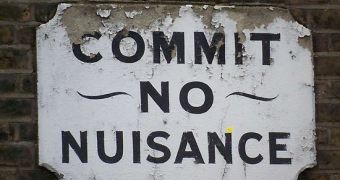The British government had major plans to declare as illegal all kinds of behavior expected to create nuisance or annoyance for other citizens. But their attempt to outlaw annoying behavior was viewed as a legal way to stop street manifestations, carolers, preachers, trick-or-treaters, church bells or noisy children.
Officials were planning on penalizing annoying behavior with a new court-imposed injunction that could prevent nuisance or annoyance and could lead offenders to prison. After the project-law was voted upon and rejected by the House of Lords, it is very likely to undergo further debate.
The measures intended to prevent nuisance or annoyance (Ipnas) were designed to replace the existing anti-social behavior orders (Asbos) which are used to sanction people over the age of 10, whose behavior can be the source of harassment or distress.
The major issue that the proposed measure brings is that it risks being used against people and not for the people. Everyone can be targeted, starting from peaceful protesters in the streets and even carolers, as annoyance is perceive subjectively.
“It risks it being used for those who seek to protest peacefully, noisy children in the street, street preachers, canvassers, carol singers, trick-or-treaters, church bell ringers, clay pigeon shooters, nudists. This is a crowded island that we live in and we must exercise a degree surely of tolerance and forbearance,” Crossbench Lord Dear says, according to Daily Mail.
The main issue of the measure was that it was attempting to change the legislation's wording, from behavior “capable of causing nuisance or annoyance” to behavior “that could reasonably be expected to cause nuisance or annoyance,” notes Daily Mail. The change in words would have given the opportunity to twist many things around and outlaw them for “being expected to cause” disturbance.
There is a constant form of nuisance on the streets, people can be bothered by the simplest actions, but that doesn't make it worthy for a formal injunction that can send a person to jail just for having what others consider an “annoying habit.”
The fact that simple actions, like caroling for example, can be sanctioned and actually lead to jail time is outrageous and it actually intervenes with one's fundamental freedoms. Besides the obvious down-parts of the project, it can also be used to turn around, in a negative way, public demonstrations that are every human being's right.

 14 DAY TRIAL //
14 DAY TRIAL //